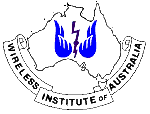NO. 1.
NO. 1A.
NO. 2.
NO. 3.
NO. 2. (re-considered)
NO. 2A.
NO. 2B.
NO. 3A.
NO. 4.
NO. 5.
NO. 6.
NO. 6A.
NO. 7.
NO. 8.
NO. 9.
NO. 10.
NO. 12.
NO. 13 and 13A.
NO. 14.
NO. 15.
NO. 16.
NO. 17.
NO. 18.
NO. 19.
NO. 20.
NO. 8.
NO. 21.
NO. 22.
Mr. Fysh:
NO. 23.
NO. 24.
NO. 25.
NO. 26.
NO. 27.
Among
the social functions attended by delegates were:
Motor trip to Mundaring weir. (13 cars)
Visit to Professor Ross, University.
Complimentary Radio dinner.
Visit to VIP
Theatre party as guest managing director Westralian Farmers 6WF
Luncheon with State Minister for Public Works (Mr. A. McCallum)
Visit to various local transmitters stations.
%%%%%%%%



